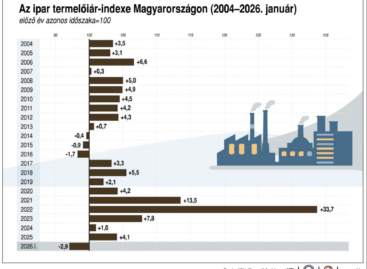Márton Nagy: Hungary can become the leader of the region
According to the latest forecast of the European Bank for Reconstruction and Development (EBRD), Hungary’s economy will stand out in the Central European and Baltic region with its 2.8 percent growth next year. Behind this lie several factors that strengthen the stability and growth potential of the Hungarian economy – writes Minister of Economic Development Márton Nagy in his opinion article published on Index.

You can read the summary of the material below, the full article can be found here.
According to Márton Nagy, Hungary will reach 90 percent of EU development by 2030, and the following signs point to this
1. Political stability: In Hungary, the ruling party has enjoyed the trust of the voters for 14 years, which has created exceptional stability. Our political stability is coupled with criticism of ideologically driven green programs and economic growth-friendly measures, which stimulate the economy.
2. Focus on family and work: For Hungarian society, family and work are extremely important. The economic and political system, which supports both the labor market and families, was built in the spirit of this.
3. Employment and unemployment: Hungary is one of the best performing countries in the EU in terms of employment rate, while unemployment is low. Since 2010, the government has continuously increased the number of employed people.
4. Investments and FDI: Hungary is also strong in terms of FDI stock. Foreign direct capital investments are constantly growing, and economic stability attracts foreign capital.
5. Export and innovation: Hungary’s exports have a high tech content, and the economy operates in a diversified structure. The country also stands out in the field of innovation and export.
6. Geopolitical complexity: The composition of investors has become more diverse, which increases the economic stability of the country. Hungary does not depend on a single large investor.
7. Infrastructure development: The development of the highway network and infrastructure investments increase the attractiveness of the country for foreign capital.
8. Budgetary stability: Hungarian public finances are in a strong position and they plan to reduce the public debt. An important element of economic stability is the quality of public finances.
9. Energy policy: Hungary is strengthening its energy policy, increasing energy independence and green energy use.
10. Digital transition: Further development is needed in the field of digital transition, especially in the digital presence of small and medium-sized enterprises.
11. Family-friendly policy: In response to demographic challenges, the government increases fertility and employment with a family-friendly policy.
12. Intensive growth: In addition to extensive growth, intensive growth
Related news
KSH: In January 2026, industrial producer prices were on average 2.9 percent lower than a year earlier and 0.9 percent higher than the previous month
🎧 Hallgasd a cikket: Lejátszás Szünet Folytatás Leállítás Nyelv: Auto…
Read more >GDP growth in OECD member countries slowed to 0.3 percent in the last quarter of last year
🎧 Hallgasd a cikket: Lejátszás Szünet Folytatás Leállítás Nyelv: Auto…
Read more >Related news
Festival buzz at the 60th anniversary EuroShop trade fair
🎧 Hallgasd a cikket: Lejátszás Szünet Folytatás Leállítás Nyelv: Auto…
Read more >Historic price reduction at ALDI
🎧 Hallgasd a cikket: Lejátszás Szünet Folytatás Leállítás Nyelv: Auto…
Read more >








